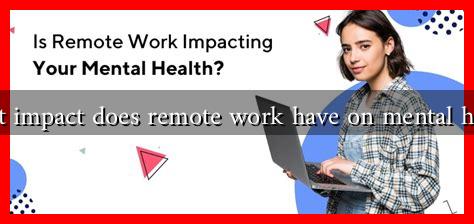-
Table of Contents
The Impact of Remote Work on Mental Health
In recent years, remote work has transitioned from a niche arrangement to a mainstream mode of employment, accelerated by the COVID-19 pandemic. While this shift has brought about numerous benefits, it has also raised important questions regarding its impact on mental health. Understanding these effects is crucial for both employees and employers as they navigate this new landscape.
Positive Effects of Remote Work on Mental Health
Remote work offers several advantages that can positively influence mental well-being. Here are some key benefits:
- Flexibility: Remote work allows employees to create their own schedules, which can lead to a better work-life balance. This flexibility can reduce stress and increase job satisfaction.
- Reduced Commute: Eliminating the daily commute saves time and reduces stress. According to a study by the U.S. Census Bureau, the average American spends about 26 minutes commuting each way. Remote work can free up this time for personal activities or relaxation.
- Increased Autonomy: Working from home often allows for greater control over one’s work environment, which can enhance productivity and reduce anxiety.
- Improved Focus: Many remote workers report fewer distractions compared to traditional office settings, leading to increased concentration and job performance.
Challenges of Remote Work on Mental Health
Despite its benefits, remote work can also pose significant challenges to mental health. Here are some common issues faced by remote workers:
- Isolation: One of the most significant drawbacks of remote work is the potential for social isolation. A survey by Buffer found that 20% of remote workers struggle with loneliness, which can lead to feelings of depression and anxiety.
- Blurred Boundaries: The lack of physical separation between work and home can make it difficult for employees to “switch off,” leading to burnout. A study by the World Health Organization (WHO) highlighted that burnout is a growing concern among remote workers.
- Communication Challenges: Remote work can hinder effective communication and collaboration, leading to misunderstandings and increased stress. A report from Gallup indicated that employees who feel disconnected from their teams are more likely to experience mental health issues.
- Increased Screen Time: The reliance on digital communication tools can lead to increased screen time, which has been linked to various mental health issues, including anxiety and depression.
Case Studies and Statistics
Several studies have explored the mental health implications of remote work. For instance, a study published in the journal Psychological Science found that remote workers reported higher levels of job satisfaction but also experienced increased feelings of isolation. Another survey by the American Psychological Association revealed that 61% of remote workers reported feeling more stressed than before the pandemic.
Moreover, a report from the mental health organization Mind found that 67% of remote workers experienced increased anxiety levels during the transition to remote work. These statistics underscore the need for organizations to prioritize mental health support for their remote employees.
Strategies for Supporting Mental Health in Remote Work
To mitigate the negative impacts of remote work on mental health, both employees and employers can adopt several strategies:
- Regular Check-Ins: Employers should schedule regular one-on-one meetings to discuss workload, challenges, and mental health concerns.
- Encourage Social Interaction: Virtual team-building activities can help combat feelings of isolation and foster a sense of community.
- Set Clear Boundaries: Employees should establish specific work hours and communicate these boundaries to their teams to prevent burnout.
- Provide Mental Health Resources: Organizations should offer access to mental health resources, such as counseling services or wellness programs.
Conclusion
The impact of remote work on mental health is multifaceted, presenting both opportunities and challenges. While the flexibility and autonomy of remote work can enhance well-being, issues such as isolation and burnout must be addressed. By implementing supportive strategies, organizations can create a healthier remote work environment that prioritizes mental health. As we continue to adapt to this evolving work landscape, it is essential to remain vigilant about the mental health of remote workers and foster a culture of support and understanding.
For more information on mental health resources, you can visit NAMI.

